EU MONITOR -Have a look at EAHP’s COVID-19 Resource Centre
The EAHP EU Monitor is a regular round up of news relevant to hospital pharmacy in Europe.
European COVID-19 drugs calculation tool – watch the tutorial
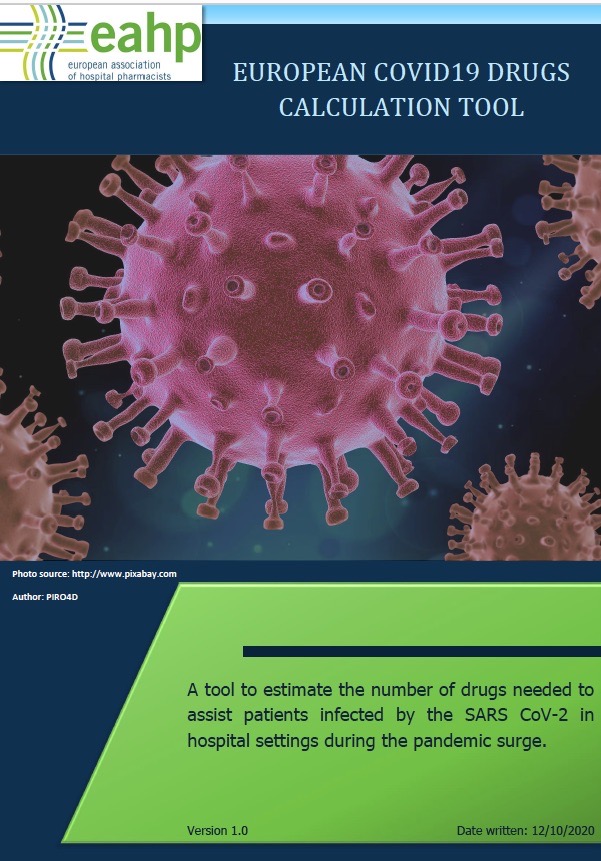 Since the outbreak of the COVID-19 pandemic, the European Association of Hospital Pharmacists (EAHP) has made available information and resources for its members. These include but are not limited to the European COVID-19 drugs calculation tool (ECDCT), the COVID-19 Resource Centre and a discussion group hosted on the Zulip platform.
Since the outbreak of the COVID-19 pandemic, the European Association of Hospital Pharmacists (EAHP) has made available information and resources for its members. These include but are not limited to the European COVID-19 drugs calculation tool (ECDCT), the COVID-19 Resource Centre and a discussion group hosted on the Zulip platform.
The ECDCT has been created to assist pharmacists, local healthcare institutions, governments, partners and other stakeholders to estimate potential requirements for essential drugs supplies to respond to the current COVID-19 pandemic. The ECDCT generates an estimation of drugs needed over a variable time frame, up to one year. The drug demand is calculated based on the forecasting of the epidemiological curve. A tutorial explaining how the tool can be used was made available this month.
In addition to the drug calculation tool, EAHP has compiled an array of resources in its COVID-19 Resource Centre. These range from information issued by national and European authorities, material prepared by healthcare professionals to journal articles and other resources. EAHP members interested to share COVID-19 experiences with other hospital pharmacists across Europe are invited to join the Zulip discussion platform. Those wishing to be added to the group are encouraged to share the interest via the contact form.
Learn more about the ECDCT HERE
Watch the ECDCT tutorial HERE
Access the COVID-19 Resource Centre HERE
Join the discussion on the Zulip platform via the contact form HERE
Information on COVID-19 vaccines and vaccinations
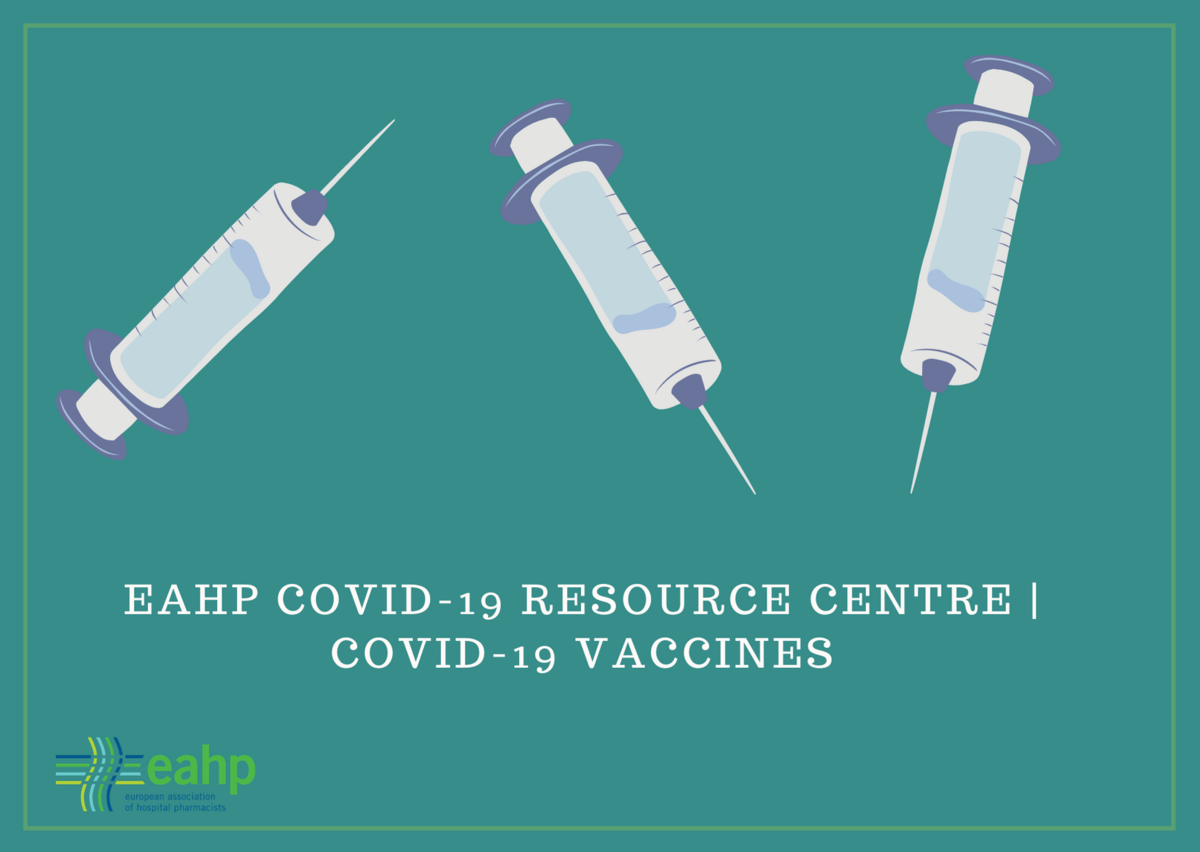 Citizens across European Union awaited the decision of the European Commission on the conditional marketing authorisation for the first COVID-19 vaccine which was issued yesterday. Vaccinations will start in all Members States on 27, 28 and 29 December 2020. Ahead of the approval, the European Commission had compiled information on the COVID-19 disease and vaccine development.
Citizens across European Union awaited the decision of the European Commission on the conditional marketing authorisation for the first COVID-19 vaccine which was issued yesterday. Vaccinations will start in all Members States on 27, 28 and 29 December 2020. Ahead of the approval, the European Commission had compiled information on the COVID-19 disease and vaccine development.
The European Commission’s webpage on “Safe COVID-19 vaccines for Europeans” outlines how two billion doses of the vaccine have been secured for the EU, provides information about vaccination and shares advice from experts. In light of the recently approved COVID‑19 vaccine developed by BioNTech and Pfizer, the European Commission has also made available Questions and Answers on COVID-19 vaccination in the EU.
To provide accurate, objective, up-to-date evidence on vaccines and vaccination in general, the European Centre for Disease Prevention and Control, the European Medicines Agency and the European Commission created the “European Vaccination Information Portal (EVIP)” earlier this year. This website outlines the mechanisms in place in the European Union to ensure that available vaccines conform to the highest standards of safety and effectiveness. Recently a specific webpage on COVID-19 vaccines was added. The webpage shares information on the activities of the European Commission, COVID-19 vaccines and facts about the pandemic. Concerning the COVID-19 vaccines, details on how they work, are developed and how their safety is monitored are being provided.
Access the webpage on “Safe COVID-19 vaccines for Europeans” HERE
Access the COVID-19 webpage of the European Vaccination Information Portal HERE
Council conclusions on COVID-19 released
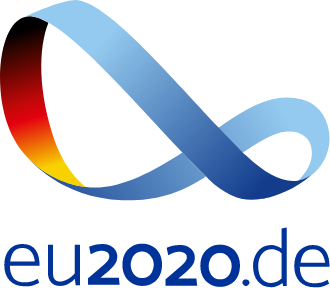 The European Council approved conclusions which draw on the lessons learned from the COVID-19 pandemic. These touch on improving crisis management, ensuring the supply of medicinal products, strengthening the EU’s role in global health and improving access to and sharing of health data.
The European Council approved conclusions which draw on the lessons learned from the COVID-19 pandemic. These touch on improving crisis management, ensuring the supply of medicinal products, strengthening the EU’s role in global health and improving access to and sharing of health data.
The Council conclusions pick up on initiatives that have already been started by the European Commission to improve crisis management and preparedness in the EU. To better ensure the supply of medicinal products across the Union the Council invites the European Commission to reinforce existing EU level tools to collect information on the whole supply chain, such as sources of supply, global manufacturing sites for active pharmaceutical ingredients (API) and other pharmaceutical substances. Also, the possibilities of facilitating the maintenance in the EU and the relocation to the EU of API manufacturing sites for critical medicinal products should be explored.
The importance of sharing and accessing health data is also acknowledged and a link to the European Health Data Space (EHDS) is mentioned. For the creation of a functioning EHDS – which will contribute to the cross-border use and re-use of health data for better healthcare, better research, as well as better policy-making and regulatory activities in health – the Council calls upon the collaboration of the European Commission, Member States, and all relevant stakeholders. Concerning the EU’s role in global health, the conclusions remind about the responsibility of the EU to strengthen existing ties with the WHO as the leading and coordinating authority on global health.
Read the Council conclusions on COVID-19 lessons learned in health HERE
EDQM webinar – Resolution to promote pharmaceutical care in Europe
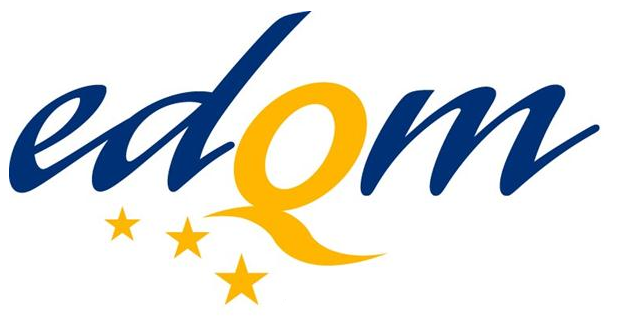
In March 2020 the Council of Europe Resolution CM/Res(2020)3 on the implementation of pharmaceutical care for the benefit of patients and health services was adopted. To better illustrate its application the European Directorate for the Quality of Medicines & HealthCare (EDQM) has released a webinar.
The resolution aims at improving medication use and the quality of patient care across Europe. To address inadequate use of medicines which can lead to suboptimal patient outcomes pharmacists are encouraged to use their expertise and that of the pharmacy team to contribute to the appropriate use of medicines and health promotion, both locally and nationally. The guidance and recommendations of the resolution seek to provide health authorities across Europe with information on how the promotion and implementation of pharmaceutical care can be supported. The resolution can also be used by healthcare professionals and associations as a legal basis for the implementation of pharmaceutical care and related working methods in their daily activities.
Access the free webinar via the following LINK
Share your good practices to tackle antimicrobial resistance
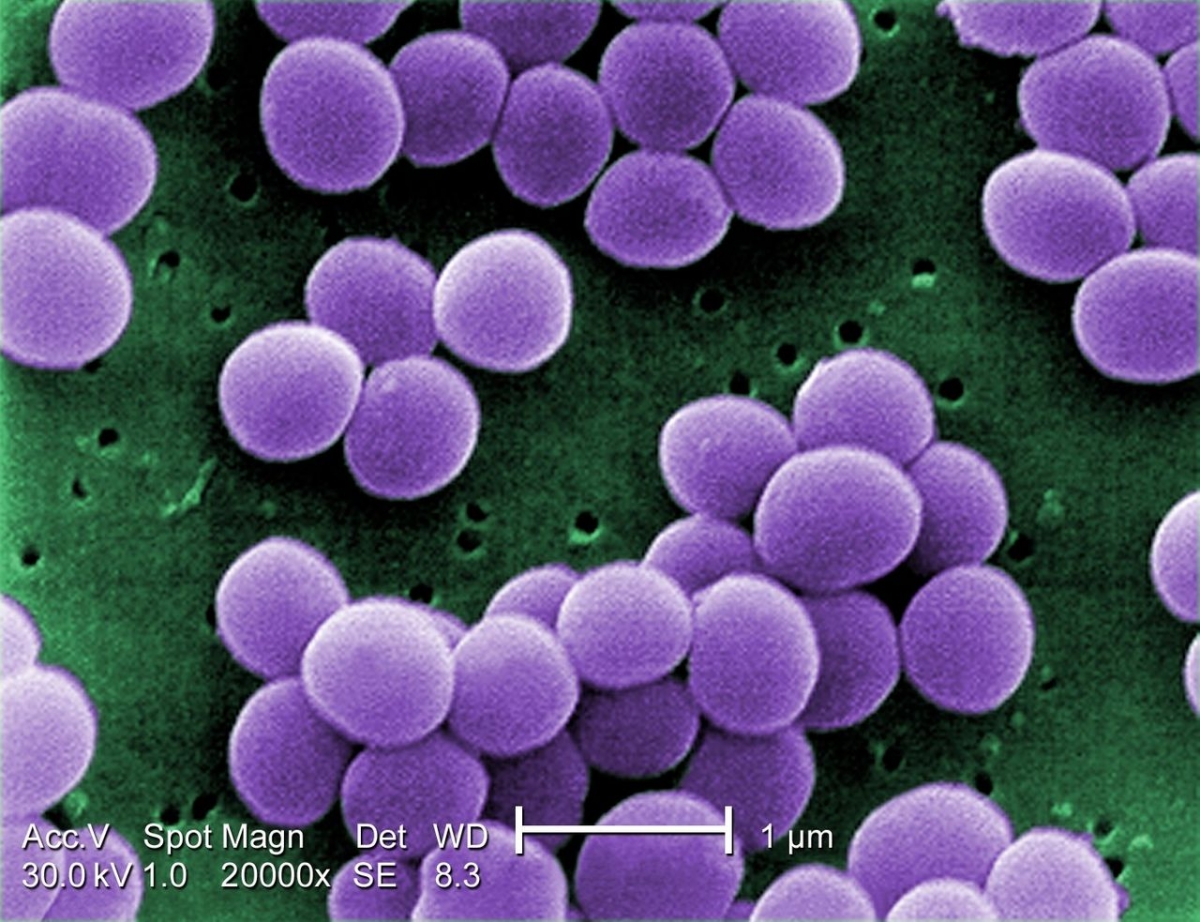 The AMR Stakeholder Network led by the European Public Health Alliance (EPHA) is looking for good practices for the successful management of antimicrobial resistance (AMR). Submit your initiative by 29th January 2021.
The AMR Stakeholder Network led by the European Public Health Alliance (EPHA) is looking for good practices for the successful management of antimicrobial resistance (AMR). Submit your initiative by 29th January 2021.
AMR can only be addressed through a multi-disciplinary approach, integrating human and animal health as well as environmental perspectives. EU and national decision-makers must therefore adopt a true ‘One Health’ approach in their actions to tackle AMR. Therefore, to be considered by the Selection Committee made up of members of the AMR Stakeholder Network, good practices submitted should fall into one of the five areas of the AMR Stakeholder Network 2019 Roadmap for Action on Antimicrobial Resistance. Also, they should tackle AMR in human, animal or environmental health.
Learn more about the call for good practices to tackle AMR and the selection criteria HERE
FIP – Medicines review toolkit for pharmacists
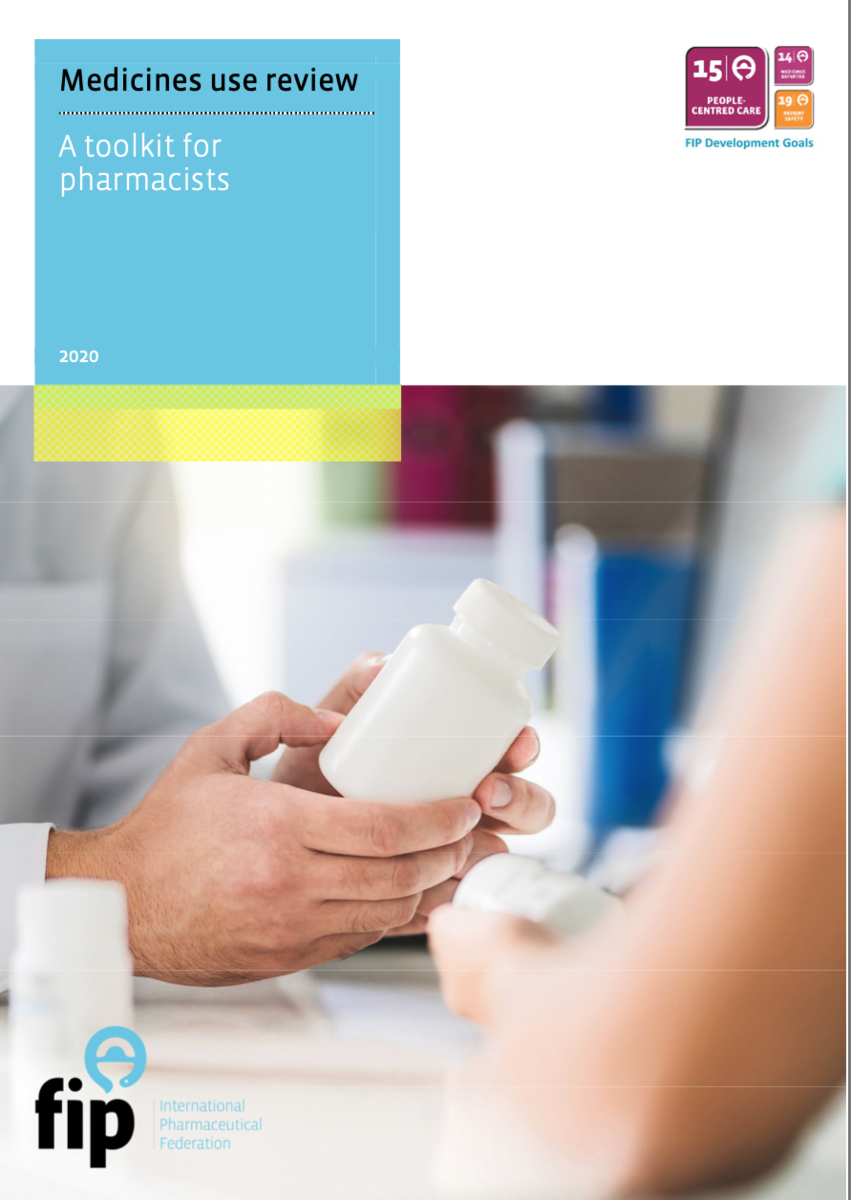 To help pharmacists tackle medication errors the International Pharmaceutical Federation (FIP) has created a toolkit for medicines use review services. The toolkit serves as a reference guide for implementing and conducting optimal medicines use reviews. It includes service implementation tools that can be directly applied or adapted for clinical practice at the patient level.
To help pharmacists tackle medication errors the International Pharmaceutical Federation (FIP) has created a toolkit for medicines use review services. The toolkit serves as a reference guide for implementing and conducting optimal medicines use reviews. It includes service implementation tools that can be directly applied or adapted for clinical practice at the patient level.
The work of FIP interlinks with the patient safety and medication-related harm initiative of the World Health Organization (WHO) which is also the focus of the third Global Patient Safety Challenge called “Medication without harm”. This is a global initiative seeks to reduce medication-related harm in all countries by 50% within five years with three specific areas for commitment, namely in high-risk situations, in patients with polypharmacy, and at transitions of care.
FIP’s toolkit provides information on the history of medication use reviews and their application in pharmacies across the world such as in Australia, Canada, Spain, Sweden, the UK and the US. Besides the impact of medication reviews, the toolkit also details how these services should best be implemented and which process should be followed.
Access the “Medicines use review: A toolkit for pharmacists” HERE
WHO interim guidance on health workforce managed during the pandemic
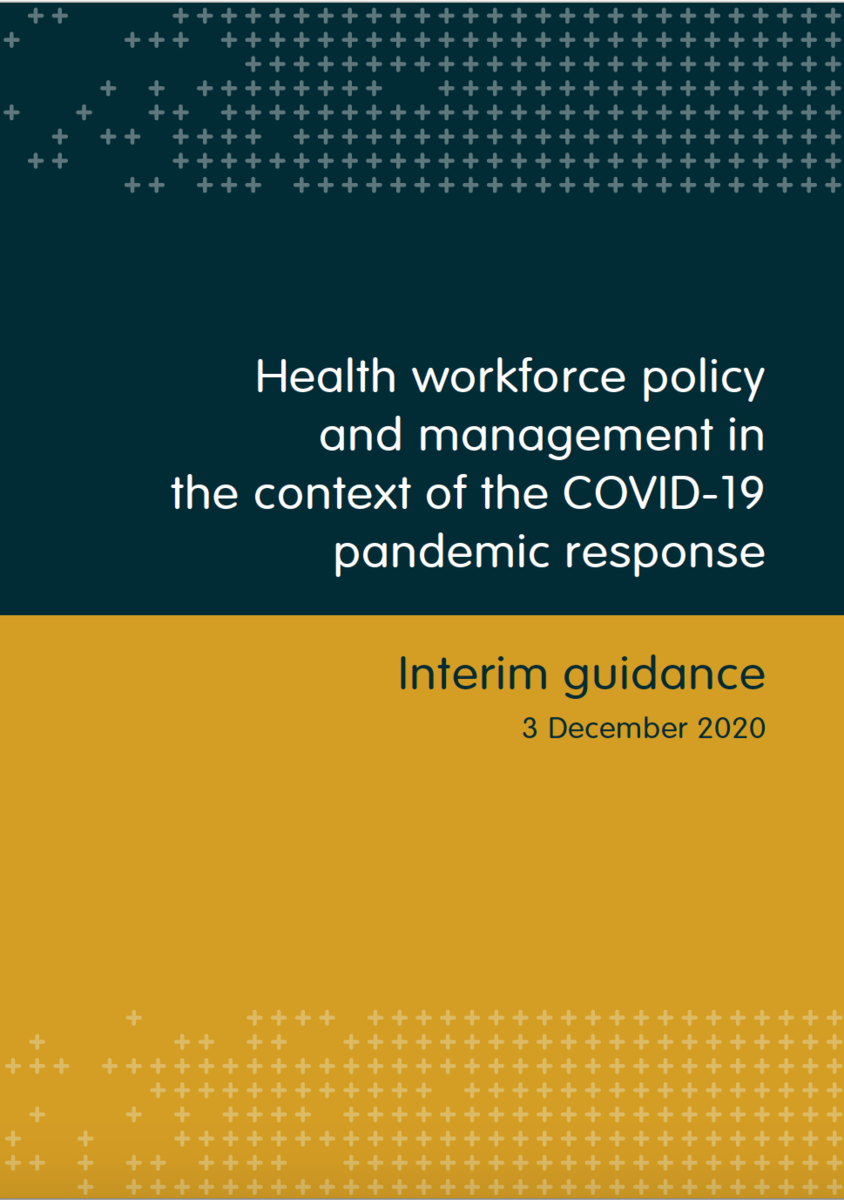 The World Health Organization (WHO) has published interim guidance on “Health workforce policy and management in the context of the COVID-19 pandemic response”. The document consolidates early evidence and identifies recommendations to protect, support and empower health workers at individual, management, organisational and system levels. It outlines COVID-19 human resources for health policy options for decision-makers and managers responsible for the planning, recruitment, training, equipment, deployment, protection and management of the health workforce at national, subnational and facility levels and some parts are also directly relevant for educators, regulators, development partners and health workers themselves.
The World Health Organization (WHO) has published interim guidance on “Health workforce policy and management in the context of the COVID-19 pandemic response”. The document consolidates early evidence and identifies recommendations to protect, support and empower health workers at individual, management, organisational and system levels. It outlines COVID-19 human resources for health policy options for decision-makers and managers responsible for the planning, recruitment, training, equipment, deployment, protection and management of the health workforce at national, subnational and facility levels and some parts are also directly relevant for educators, regulators, development partners and health workers themselves.
The creation of the interim guidance was triggered by the pre-existing health workforce challenges, including the shortages of healthcare workers, that many countries are globally facing, which have been further impacted by COVID-19. The guidance seeks to outline how the additional service delivery needs for managing the pandemic can be balanced with the need for preserving and enhancing access to essential health services. The guidance covers the following areas:
- Supporting and protecting health workers (i.e. infection prevention and control, including use of and access to personal protective equipment; decent working conditions, including occupational health and safety; mental health and psychosocial support; and remuneration and incentives)
- Strengthening and optimising health workforce teams (e.g. building competencies through education and training)
- Increasing capacity and strategic health worker deployment (e.g. improving health worker availability through hiring and redeployment, and ensuring a supportive work environment, including a manageable workload)
- Health system human resources strengthening (e.g. improving health workforce information systems, including to track health worker infections; assessment and planning of health workforce needs; and licensing and regulation reforms).
Read the interim guidance HERE
Joint EMA-HMA strategy
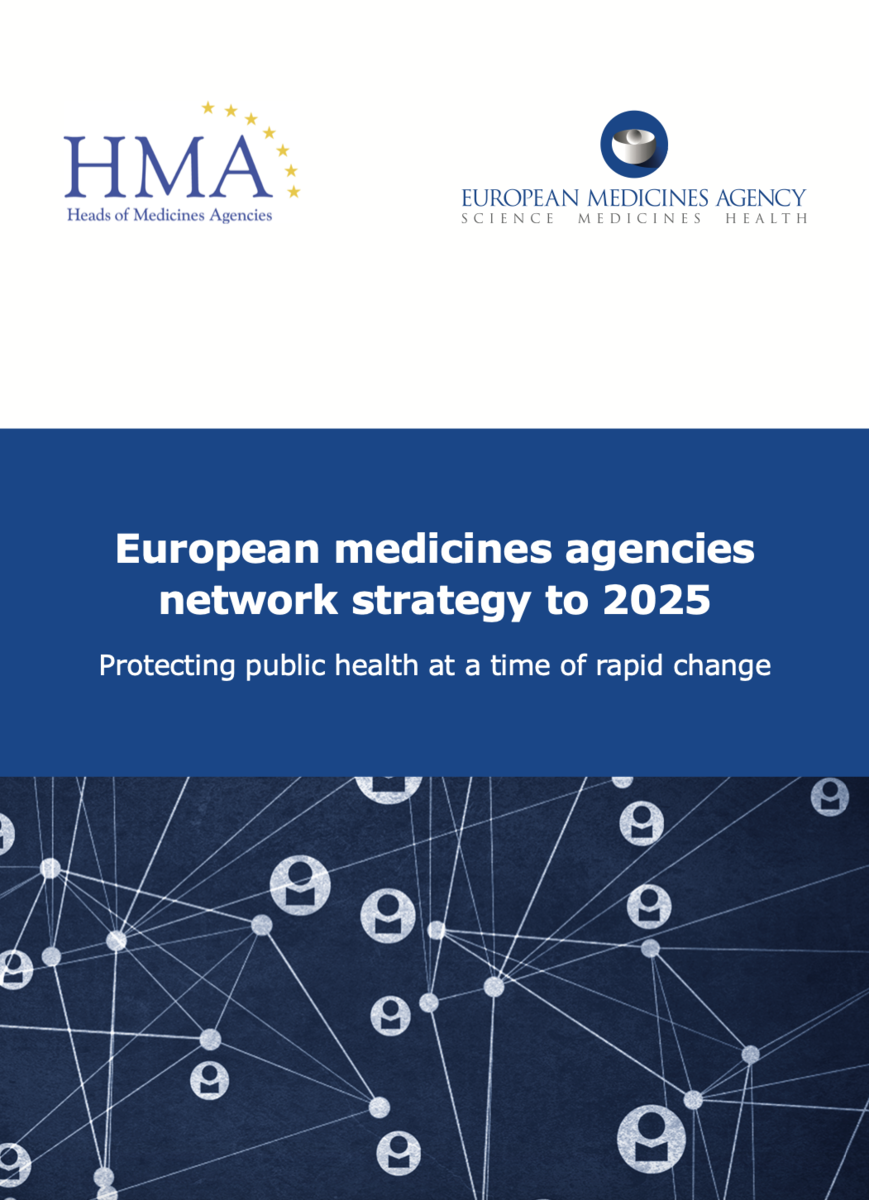 In mid-December, the European Medicines Agency (EMA) and the Heads of Medicines Agencies (HMA) published their joint strategy. This document sets out the work of both agencies in the next five years with an emphasis on protecting public health at a time of rapid change. Specific focus is put on how the European medicines regulatory network can continue to enable the supply of safe and effective medicines that meet patients’ needs in the face of challenges posed by ever-accelerating developments in science, medicine, digital technologies, globalisation as well as emerging health threats, such as the COVID-19 pandemic.
In mid-December, the European Medicines Agency (EMA) and the Heads of Medicines Agencies (HMA) published their joint strategy. This document sets out the work of both agencies in the next five years with an emphasis on protecting public health at a time of rapid change. Specific focus is put on how the European medicines regulatory network can continue to enable the supply of safe and effective medicines that meet patients’ needs in the face of challenges posed by ever-accelerating developments in science, medicine, digital technologies, globalisation as well as emerging health threats, such as the COVID-19 pandemic.
The joint strategy of EMA and HMA outlines the actions of both agencies in the following six priority areas:
(1) the availability and accessibility of medicines;
(2) data analytics, digital tools and digital transformation;
(3) innovation;
(4) antimicrobial resistance and other emerging health threats;
(5) supply chain challenges; and
(6) the sustainability of the network and operational excellence.
For each of these priority areas the main challenges were identified and topic-related goals, including proposals for high-level objectives that might form the starting point of actions to address these goals, have been put forward. The European medicines regulatory network will review the strategy after 18 months to consider if the goals and objectives remain appropriate, and to adjust them if necessary, in the light of the changing environment and ongoing engagement with stakeholders.
Read the strategy HERE
EJHP: Read the January issue!
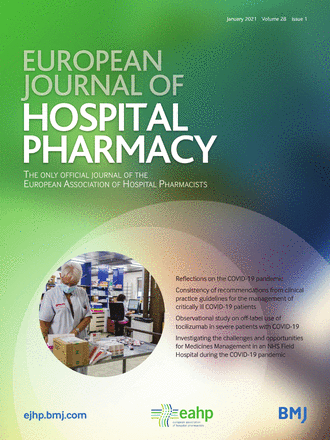 The latest issue of the European Journal of Hospital Pharmacy (EJHP) is available. It features two editorials, systematic reviews on the prevalence of drug-drug interactions in hospital settings and several original articles and short and case reports. Among other things, it informs about the newly adopted position paper of EAHP on pharmacy preparations and compounding.
The latest issue of the European Journal of Hospital Pharmacy (EJHP) is available. It features two editorials, systematic reviews on the prevalence of drug-drug interactions in hospital settings and several original articles and short and case reports. Among other things, it informs about the newly adopted position paper of EAHP on pharmacy preparations and compounding.
Read the December issue HERE
 [COVID-19 Updates]
[COVID-19 Updates]
EAHP’s COVID-19 Resource Centre
To assist its member associations and individual hospital pharmacists in this critical time with the provision of the best possible care for patients, EAHP has decided to gather and make available information on COVID-19 relevant for the hospital pharmacy profession.
Access the Resource Centre HERE
Research in Social and Administrative Pharmacy – Provision of clinical pharmacy services during the COVID-19 pandemic: Experiences of pharmacists from 16 European countries
This study sought to explore the views and experiences of clinical pharmacists in relation to the provision of clinical pharmacy services during COVID-19.
Read the article HERE
JACCP: Journal of the American College of Clinical Pharmacy – Adapting Clinical Pharmacy Staffing Models During the COVID-19 Pandemic: Lessons Learned and Considerations for Future Disaster Planning
The article aims to elucidate how pharmacy departments adapted their staffing models, and the impact on frontline staff satisfaction.
Read the article HERE
COVID-19 rapid guideline: dermatological conditions treated with drugs affecting the immune response
The purpose of this guideline is to maximise the safety of children and adults who have dermatological conditions treated with drugs affecting the immune response during the COVID-19 pandemic.
Access the guideline HERE
The European Statements of Hospital Pharmacy – EAHP’s Self-assessment tool
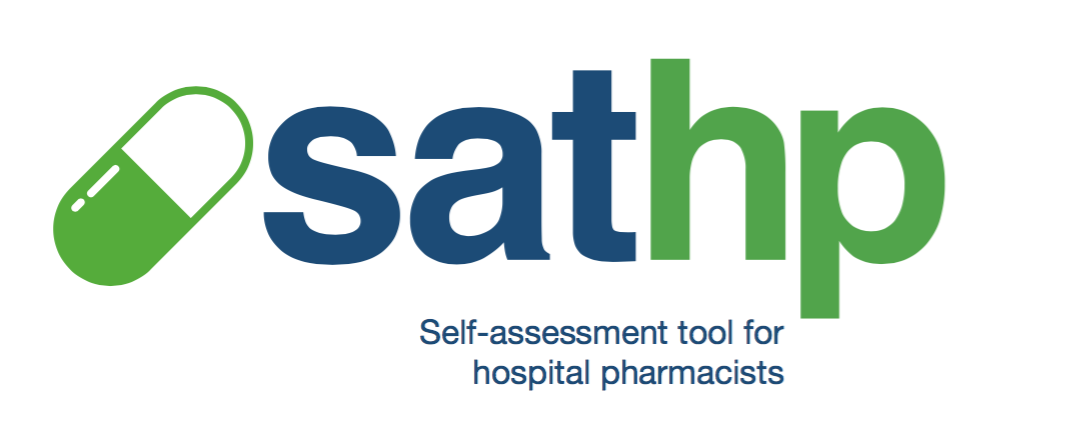
EAHP’s online Self-Assessment Tool (SAT) aims at helping hospital pharmacists with the assessment of their Statement implementation status. More than 270 hospitals have already used this tool to review their level of compliance and to work on the improvement of the level of Statement implementation in their hospital pharmacy. To facilitate the use of the tool, you can find the SAT tool in 13 different languages (Czech, English, French, German, Greek, Hungarian, Italian, Polish, Portuguese, Romanian, Serbo-Croatian, Spanish and Turkish). Assess your pharmacy via the following LINK.
___________________________________________________________________________________
Consultations
![]()
EMA – Guideline on registry-based studies
The guideline was developed based on the comments received on the discussion paper on ‘Methodological and operational considerations on the use of patient disease registries for regulatory purposes’, that went through a public consultation between November 2018 and June 2019, and a consultation of EMA Committees and Working parties.
Deadline – 31st December 2020
Access the consultation HERE
EDQM – Pharmeuropa PaedForm, Issue 2
The EDQM has just released issue 2 of Pharmeuropa PaedForm, in which the third monograph elaborated by the PaedForm Working Party, the draft text for an ethanol-free formulation for Furosemide 2 mg/mL Oral Solution, is published for public consultation prior to its inclusion in the European Paediatric Formulary.
Deadline – 31st December 2020
Find more information HERE
EDQM – Pharmeuropa PaedForm, Issue 3
The European Directorate for the Quality of Medicines & HealthCare (EDQM) released Issue 3 of Pharmeuropa PaedForm, in which the draft text for Phosphate 60 mg/mL Oral Solution is published for public consultation prior to its inclusion in the European Paediatric Formulary. This is the fourth monograph elaborated by the PaedForm Working Party.
Deadline – 31st March 2021
Find more information HERE
